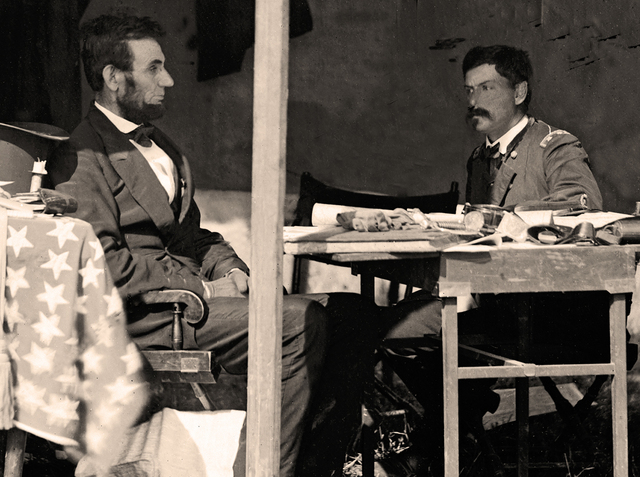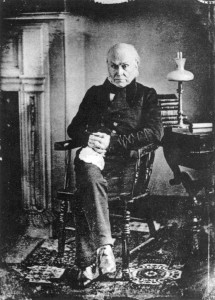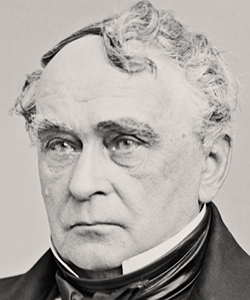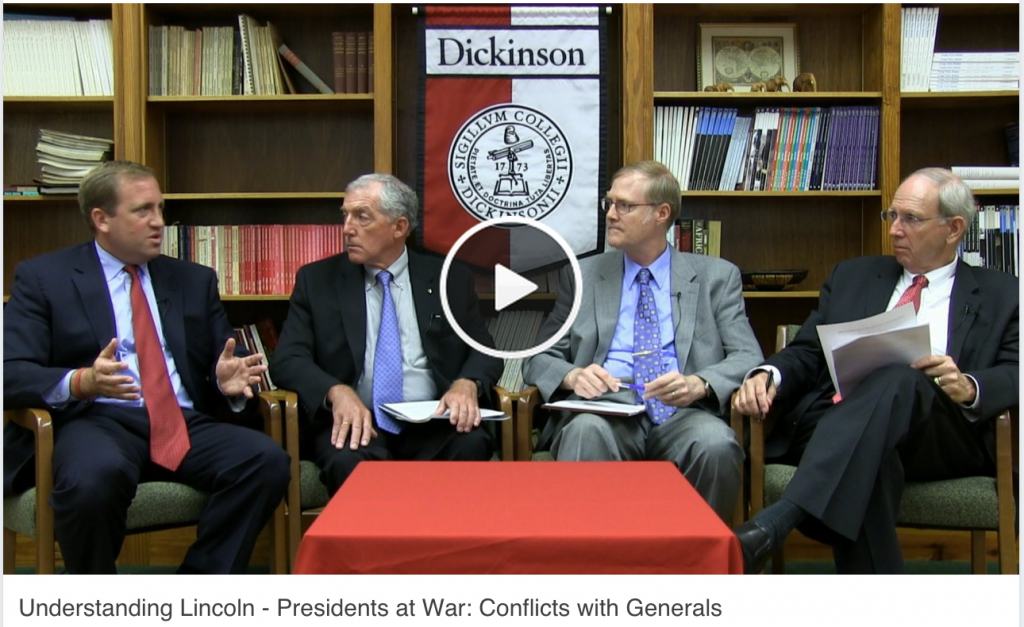Historical Background
Sometimes students get confused by the concept of the “law of war.” There is not law in warfare goes a common refrain –anything goes. Yet in many ways the entire concept of international law is grounded in doctrines about how war or armed conflict can be conducted in legitimate ways. There are several dimensions to this concept in the American context, including the challenges of maintaining a civil-military relationship within a constitutional system and also the recurring debates over what –if any– international responsibilities should limit an American nation engaged in armed conflict. There is no doubt that Abraham Lincoln cared deeply about the law of nations and the law of war. He encountered them as a 19th-century lawyer and politician. He quoted from them in some key public documents. He invoked them as commander-in-chief. But most important, he considered himself and the American government to be bound by them—or at least obligated to take international legal doctrine seriously as they waged a domestic civil war. In fact, he ordered a noted (and now obscure) scholar named Francis Lieber to help codify these obligations in what became one of the most important legal legacies of the American Civil War.
Nor was Lincoln alone in these beliefs. He lived in an age when Americans took international legal obligations seriously. The reason for this commitment is relatively easy to explain. When the United States was still a rising power, surrounded by large, hostile empires and threatened by its own internal divisions, a firm belief in the laws of nations and the laws of war was considered both right in principle and essential to the security of the republic. Yet in modern times, as American power has outstripped all others, the claims of international obligations can seem unnecessary, even counterproductive. The Civil War experience, however, offers a powerful reminder that “a decent respect to the opinions of mankind,” as Thomas Jefferson once framed it in the Declaration of Independence, has a rich tradition in American history.
- Francis Lieber’s copy of Emmerich de Vattel’s Law of Nations (1758/1844)
- Declaration of Independence (1776)
Lincoln’s Example
Once you start looking for the role of international law within the story of the American Civil War, you find it just about everywhere. Less than a week after Fort Sumter fell in mid-April 1861, President Lincoln “set on foot a blockade” of southern ports, delicately invoking what he termed both “the laws of the United States” and “the law of Nations.” The strategy was complicated because acknowledging international legal protocols for a blockade essentially conceded to the Confederates a belligerent status that unionists had originally hoped to deny them.
This explains the furious Union diplomatic counteroffensive in 1861 and 1862 aimed at heading off full European—especially British—recognition of the Confederacy. It is all too easy to overlook the gravity of this international political threat from today’s perspective, but, at the time, it mattered almost as much as the Southern armies themselves. Nineteenth-century Americans knew their revolutionary history. They understood that, without a French alliance, there might never have been a victory at Yorktown and perhaps no American independence. They also realized that decades of national policy designed to secure that independence by driving European powers out of the Americas was now suddenly in jeopardy. The Royal Navy was not only looming larger along the Atlantic, but also French forces had seized the moment to occupy Mexico. The Monroe Doctrine was literally crumbling in the face of secession.
Out of this tense climate was born a final legal battle over emancipation that was also in many ways all about the law of nations. This is one of the great contributions of some new work by historian James Oakes. In two recent monographs, Freedom National (2013) and The Scorpion’s Sting (2014), Oakes details how anti-slavery politicians had been building their arguments on the basis of international law for decades prior to the outbreak of actual hostilities. Ex-president John Quincy Adams helped pioneer these claims when he first warned in the 1830s that the international “law of war” might trigger military emancipation during a time of domestic rebellion. “From the instant that your slaveholding states become the theatre of war,” he thundered on the floor of the House of Representatives in 1836, “the war powers of Congress extend to the interference with the institution of slavery in every way in which it can be interfered with.”
During the 1840s and 1850s, a generation of younger anti-slavery lawyers and politicians then applied international law to peacetime circumstances in a manner that helped define a new, more aggressive “free soil” movement. Figures such as Salmon P. Chase, William Henry Seward, and Charles Sumner routinely invoked the “law of nature and of nations” or what Seward provocatively called “higher law” to justify free soil policies that would contain slavery without war and thus help see it through, in the words of Abraham Lincoln, toward its “ultimate extinction.”
Once the shooting war began in 1861, however, the question for Republicans was about whether or when to shift from free soil to military emancipation. Some figures, like the new Senate foreign relations committee chairman Charles Sumner, almost immediately invoked the old Quincy Adams arguments and pressed for emancipation by military decree. Others, like Secretary of State Seward and President Lincoln, were more cautious. A veritable pamphlet war erupted across the North in 1861 and 1862 over the international legal ramifications of these choices. Yet practically all Unionists approved of employing at least some elements of the law of war against Confederate slavery. Union General Benjamin Butler, a lawyer by training and a Democrat, famously relied on such principles in early summer of 1861 to declare runaway slaves who came behind his lines as “contraband of war.” Republicans in Congress subsequently pushed through confiscation legislation in August 1861 and again in July 1862 which included provisions that ultimately deemed Confederate slaves as “captives of war” under international legal doctrines and authorized the President to declare them, “forever free.”
This authorization from the Second Confiscation Act (July 17, 1862) forced President Lincoln’s hand and propelled him toward the Emancipation Proclamation of January 1, 1863. It also propelled him toward a series of strategic conflicts with his military commanders. Throughout the first two years of the war, Union General-in-Chief George McClellan resisted the idea that the Civil War required emancipation as a military necessity. Lincoln and McClellan clashed repeatedly over this issue, leading eventually to McClellan’s dismissal in November 1862 and his decision to run against Lincoln in the presidential contest of 1864. That particular story is well known, but the degree to which debates over international law affected President Lincoln and even contributed to the actual wording of the January 1st proclamation has been almost ignored in American classrooms. Yet legal historian Burrus M. Carnahan has rightfully pointed out that the last sentence of the emancipation proclamation contains a direct, intentional, and significant reference to international law.
And upon this act, sincerely believed to be an act of justice, warranted by the Constitution, upon military necessity, I invoke the considerate judgment of mankind, and the gracious favor of Almighty God.
Lincoln did not actually write that final sentence. It was drafted for him by Secretary of Treasury Chase who consulted with Senator Sumner and then quoted a memorable phrase that the senator had been using during the confiscation debates. Sumner believed that renowned international legal scholar Emmerich de Vattel—a favorite of the anti-slavery movement—suggested in his seminal work, The Law of Nations (1758), that it would be “an act of justice” to free an oppressed people during a time of war. Chase/Lincoln concluded the emancipation proclamation by invoking “the considerate judgment of mankind and the gracious favor of Almighty God,” in the name of a military decree, “sincerely believed to be an act of justice.” Lincoln later punctuated his acceptance of these international legal arguments for military emancipation by writing in August 1863, “I think the Constitution invests its commander-in-chief, with the law of war, in time of war.”
That Lincoln was serious about understanding the exact nature of the international law of war is the organizing thesis of another recent prize-winning historical study. John Fabian Witt’s Lincoln’s Code (2012) argues that one of the Civil War’s most enduring global legacies was in establishing modern legal precedents for wartime codes of conduct. Witt describes how almost simultaneous with the development of its emancipation policy, the Lincoln administration was also commissioning a Columbia University political scientist named Francis Lieber to compile a series of orders for the Union army directing their conduct toward belligerents and civilians under the highest standards of contemporary laws of war. Lieber was a German immigrant who had taught for years in South Carolina and who had sons in both armies. Widely respected as a scholar, Lieber produced General Orders No. 100 in April 1863 which became known as the Lieber Code, and which later provided critical precedents for The Hague and Geneva conventions of war.
- Presidential Proclamation (April 19, 1861)
- Contraband of War (May 1861)
- Congressional Confiscation Acts (August 1861 / July 1862)
- Emancipation Proclamation (January 1, 1863)
- Letter to James Conkling (August 26, 1863)
- Lieber Code (General Orders No. 100, April 24, 1863)
- Vattel in Google Ngram Viewer
Modern Debates
Most Americans do not yet know the details of this story or appreciate the larger role of international law during the Civil War. Yet the recent outpouring of scholarship on this subject and the renewed relevance of the topic in an age of terror suggest that people might soon pay far more attention to it. Of course, whether more attention provides better answers is an entirely different question. After all, the implementation of the Lieber Code did not prevent the “hard hand of war” from devastating areas of the South in the final months of the conflict. It certainly did not transform the Civil War into something civilized. International law was a contested space then just as it is now. One commander’s claim of necessity can often become another’s illustration of atrocity. That is partly what makes modern-day arguments about international law so frustrating for many Americans. However, Lincoln and his peers did not shy away from such difficult challenges. Neither should policymakers today. The “opinions of mankind” have always mattered to Americans and always should.
In 2014, a panel of military experts came together at Dickinson College to assess one particular aspect of the evolving American engagement with the laws of war –namely, the civil-military relationship and how it has changed since the days of Lincoln’s clashes with McClellan and his other generals. Dr. Jeffrey McCausland from the Strategic Studies Institute moderated a panel that included Conrad Crane, Director of the Military History Institute, retired general Paul Eaton, and “Understanding Lincoln” instructor Matthew Pinsker. For more details on the panelists, click on this press release.




